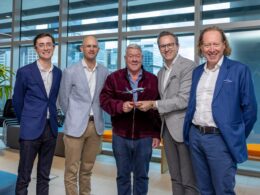Siemens has joined forces with UK-based Paragon Resources to scale up a new hydrogen production method that operates without fossil fuels or external electricity, following the signing of a memorandum of understanding (MoU) between the two companies.
Hydrogen is widely viewed as a critical solution for decarbonising industrial heating and transport, given its zero emissions at the point of use. However, the production of hydrogen remains highly carbon-intensive, with around 92% of global supply derived from fossil fuel-based methods such as steam methane reforming.
Paragon Resources has developed a patented alternative that avoids these conventional high-emission techniques. Its process generates hydrogen by reacting recycled aluminium with water in the presence of a proprietary catalyst. The exothermic reaction produces hydrogen gas, aluminium hydroxide, and heat—without requiring electricity, electrolysis, or fossil fuel inputs.
The system is designed to be self-sustaining, capturing the heat generated to produce electricity that powers the process itself. The by-product, aluminium hydroxide, is emissions-free and has commercial applications across multiple sectors, including pharmaceuticals, ceramics, water treatment, and fire retardants. The approach also facilitates recycling of aluminium waste that might otherwise end up in landfill.
Under the MoU, Siemens will support the industrial scaling of this technology by integrating its Xcelerator digital platform. This includes automation systems, AI-based optimisation, digital twin simulations, and cybersecurity solutions, enabling remote monitoring and enhanced operational efficiency.
Andy Lane, Senior Commercial Manager at Siemens, said: “Tackling the challenge of upscaling hydrogen production will be impossible without a willingness to collaborate. By integrating our automation and digitalisation expertise, we look forward to working with the team at Paragon to drive the creation of a robust hydrogen market for the UK that also supports other facets of sustainability including resource efficiency and circularity.”
The partnership also comes amid growing scrutiny of the aluminium sector’s environmental footprint. According to the International Energy Agency (IEA), aluminium production accounted for approximately 3% of global industrial emissions in 2022. The IEA’s Net Zero by 2050 scenario calls for emissions intensity in the sector to fall by around 4% annually by 2030—nearly double the current rate of decline.
The Paragon-Siemens collaboration offers a potential pathway to reduce both hydrogen-related and aluminium-linked emissions by combining clean fuel production with aluminium waste recovery.
















